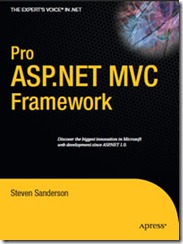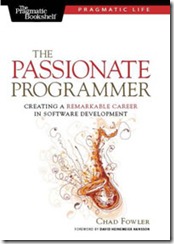This article also appears in Canadian Developer Connection.
I’m reading a couple of tech books right now, and I plan to publish more in-depth reviews of them in the next couple of weeks. In the meantime, I thought I’d give you some quick reviews to give you a taste.
Pro ASP.NET MVC Framework by Steve Sanderson (Apress)
 The first book is Pro ASP.NET MVC Framework, published by Apress and written by Steven Sanderson. It’s been available in “beta” form as a PDF for the past couple of months, and as of this afternoon, the final PDF version has been released. I expect that the dead-tree edition should be hitting the shelves of your favourite bookstore, real or virtual, in a week or so.
The first book is Pro ASP.NET MVC Framework, published by Apress and written by Steven Sanderson. It’s been available in “beta” form as a PDF for the past couple of months, and as of this afternoon, the final PDF version has been released. I expect that the dead-tree edition should be hitting the shelves of your favourite bookstore, real or virtual, in a week or so.
This book covers the new way of developing ASP.NET applications, the MVC way. If you’ve read the “Gang of Four” book or any other book on design patterns (or any of Rocky Lhotka’s books on business objects), you know that MVC is short for “Model-View-Controller” and a pattern for separating an application into its business logic, presentation and interface. Perhaps you’ve looked longingly as the “cool kids” have used frameworks like Ruby on Rails and Django to build applications with greater speed and fun, and fewer errors and less futzing around with tedious development minutiae. You might have heard Scott Hanselman and Phil Haack talk about their work on ASP.NET MVC, or maybe you’d heard that Jeff Atwood’s Stack Overflow is implemented in ASP.NET MVC.
I myself come from the world of Rails and have noodled with Django. As such, find that I’d rather use an MVC-style framework in most cases. That’s why I’m happy that ASP.NET MVC has hit the official “1.0” stage – it’s available for download right now and will be included in Visual Studio 2010 as an official alternative to old-school ASP.NET.
The book is a great introduction to the concepts of MVC web frameworks in the context of ASP.NET. It starts by showing you how to get the ASP.NET MVC tools and templates onto your system and then walks you through the development of a sports store ecommerce site. The middle part goes into the features of ASP.NET MVC in greater detail, covering REST and routing, controllers and views, testing and adding Ajax to your MVC applications. The last section covers the goodies that ASP.NET gives you – authentication, members/roles/profiles, caching/compression and WebForms – and how to use them in the context of ASP.NET MVC.
It looks like a pretty promising read on a topic that I’m very interested in. Watch this blog for a review, and eventually, some code examples based on what I learn from the book.
The Passionate Programmer by Chad Fowler (Pragmatic Bookshelf)
 Regular readers of this blog will know that my favourite developer book of 2008 was Pragmatic Thinking and Learning: Refactor Your Wetware. They also know that there really wasn’t much about software development in particular, but developing the most important tool for software development: your mind.
Regular readers of this blog will know that my favourite developer book of 2008 was Pragmatic Thinking and Learning: Refactor Your Wetware. They also know that there really wasn’t much about software development in particular, but developing the most important tool for software development: your mind.
The publishers of Pragmatic Thinking and Learning have just put out a “new-ish” book, The Passionate Programmer, written by Chad Fowler. I say it’s “new-ish” because it could be considered a second edition of his book My Job Went to India (and All I Got was this Lousy Book).
The problem with My Job Went to India was that the title implied that it was largely about saving your job from outsourcing. In a recent podcast about the book, Chad said that the book’s title influenced the way he wrote it, and it ended up not being quite the book he wanted to write.
The Passionate Programmer is different; you could consider it a “refactoring” of My Job Went to India, and a good one, too. Rather than focusing on saving your job, it’s more about two very important things:
- Finding fulfillment and happiness in your career
- Cultivating the desire to live a remarkable life
Those are two pretty tall orders for a book, but I’ve met Chad at a couple of conferences, and I know he likes to think big. I’ve just started into The Passionate Programmer and so far, I’ve thought “damn right!” at every bit of advice he’s given. As with Pro ASP.NET MVC Framework, watch this blog for the full review of this book.